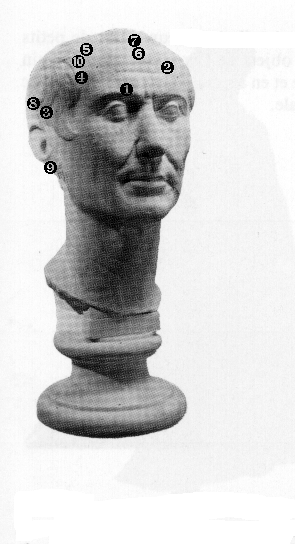
Caius Julius Caesar (100 bc - 44 bc)
What is the psychological identity of Caius Julius Caesar , the most notorious Roman statesman and military leader of his time?
Let's look at Caesar from the viewpoint of Phrenology . The skillful hands of contemporary master sculptors have provided us with some marvellously crafted heads of the heroes of Antiquity. The illustrated Caesar head can be admired in the archaeological museum in Torino, Italy.
Let's first take a look at Caesar's forehead. Is he a practical or a theoretical mind? Oh no, Caesar is certainly not a philosopher. However, his front is of a perfect architecture:
- Extreme width
- Nice height, even at the sizes
- Extremely well developed base, which even covers the eyes (1)
- The front is slightly sloping: the lower part of it is more developed then the upper part. Thus: realist, objective type. The Causality (2) is rather negative.
- Very strong development of Constructiveness (4) which is reflected in Caesar's battle prowesses: the siege of Alesia, the bridge over the river Rhine....
This comes together with a very strong development of Individuality (2): very strong perceptions, practical orientation, taking into account every element.
Summarising, a man perfectly built to win and obtain victory on earth....
The Benevolence (6) is rather neutral;
the Veneration (7) however is depressed, in
the god-less creature as which Caesar is known by history.
The back of the head is slightly convex (8): this man was thus able
to give a certain Affection. Facing his soldiers,
he gave in fact signs of Affection which made him very popular (even if
his practical mind will have had an influence on this!).
The Amativeness (9) is clearly positive.
The skull is much more developed at the ears than above them: Cautiousness
(10) is negative.
The Destructiveness (3) being very
wide, this gives brutal vindictiveness, and fearlessness. The negative
Conscientiousness (5) will make him
act as an imposter. Added to a negative Veneration
(7) and Spirituality, all moral values will be trodden.
General summary: A fierce energy reminescent of prehistory, at the service of an exceptional intelligence.
This Phrenological description was adapted from Prof. Bouts' Psychognomy, with the kind permission of the author.
Disclaimer:
No one but the author of these pages
accounts for their contents.